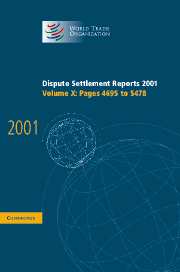United States - Anti-Dumping Measures on Certain Hot-Rolled Steel Products from Japan (WT/DS184): Report of the Appellate Body
Published online by Cambridge University Press: 13 December 2017
Summary
INTRODUCTION
The United States and Japan appeal certain issues of law and legal interpretations in the Panel Report, United States - Anti-Dumping Measures on Certain Hot Rolled Steel Products from Japan (the “Panel Report”). The Panel was established to consider a complaint by Japan with respect to anti-dumping measures imposed by the United States on imports of certain hot-rolled flat-rolled carbon-quality steel products (“hot-rolled steel”) from Japan.
On 15 October 1998, the United States Department of Commerce (“USDOC”) initiated an anti-dumping investigation into imports of hot-rolled steel from, among others, Japan. USDOC determined that it was not practicable to examine all known Japanese producers and exporters and, therefore, conducted its investigation on the basis of a sample of Japanese producers. USDOC selected Kawasaki Steel Corporation (“KSC”), Nippon Steel Corporation (“NSC”), and NKK Corporation (“NKK”) for individual investigation. USDOC calculated an individual dumping margin for each of these companies. USDOC also established a single rate of anti-dumping duty applicable to all those Japanese producers and exporters not individually investigated (the “all others” rate). The “all others” rate was calculated as the weighted average of the individual dumping margins calculated for KSC, NSC and NKK. On 6 May 1999, USDOC published its final affirmative dumping determination. On 23 June 1999, the United States International Trade Commission (the “USITC”) published its final affirmative determination of injury to the United States’ hot-rolled steel industry. On 29 June 1999, USDOC published an antidumping duty order imposing anti-dumping duties on imports of hot-rolled steel from Japan. The factual aspects of this dispute are set out in greater detail in paragraphs 2.1 to 2.9 of the Panel Report.
The Panel considered claims by Japan that, in imposing the specific antidumping measures on hot-rolled steel, the United States acted inconsistently with Articles 2.1, 2.2, 2.3, 2.4, 3.1, 3.2, 3.4, 3.5, 3.6, 4.1, 6.1, 6.6, 6.8, 6.13, 9.3, 9.4, 10.1, 10.6, and 10.7 and Annex II of the Agreement on Implementation of Article VI of the General Agreement on Tariffs and Trade 1994 (the “Anti-Dumping Agreement ”); and with Article X:3 of the General Agreement on Tariffs and Trade 1994 (the “GATT 1994”);
- Type
- Chapter
- Information
- Dispute Settlement Reports 2001 , pp. 4697 - 4768Publisher: Cambridge University PressPrint publication year: 2004
- 5
- Cited by

